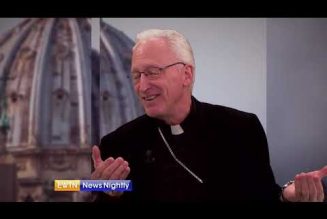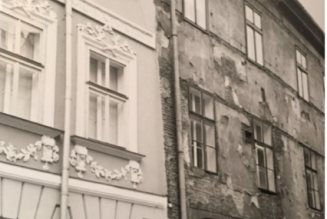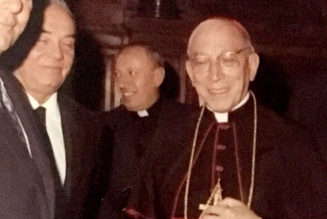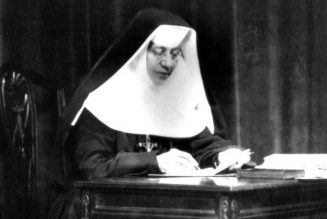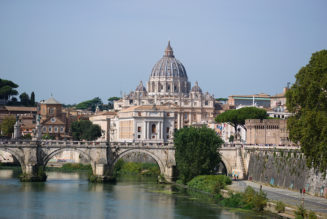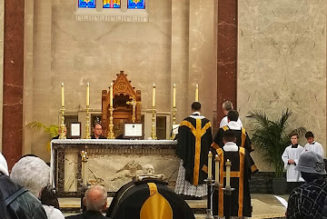ROME – Yesterday Crux carried two stories which, at first blush, appear unrelated. The first concerned the latest Ukrainian backlash against Pope Francis’s praise of “Great Mother Russia,” while the second covered the discovery of a previously unnoticed bit of anti-fascist graffiti from the WWII years in the Vatican’s Secretariat of State.
Yet pushing beyond the headlines, the two stories do actually have something in common: To wit, they point to mounting concern among Pope Francis’s advisers and allies that just as his predecessor Pius XII has been pilloried as “Hitler’s Pope,” something similar could befall Francis down the line vis-à-vis Vladimir Putin.
(For that matter, the same accusation can, and has, been lodged against Francis with regard to Chinese Premier Xi Jinping, but that’s a matter for another time.)
To begin with the Ukraine story, it pivots on Mykhailo Podolyak, a senior advisor to President Volodymyr Zelensky, who has styled Francis as “pro-Russian” and “not credible” for his remarks in praise of Russian culture delivered in late August in a video address to Russian Catholic youth.
It’s merely the latest example of a consistent stream of criticism from Ukraine and the country’s sympathizers in the West which holds that, in his effort to appear even-handed, Francis too often has ended up seeming to appease Putin and his Russkiy mir imperial ambitions.
Meanwhile, the graffiti story is interesting, beginning with the fact that it was co-authored by Andrea Tornielli, a veteran Italian journalist who, since 2018, has been the Vatican’s editorial director and thus de facto the official guardian of Francis’s legacy.
The piece of graffiti, discovered hidden in tiny script amid a leafy decoration on a window jamb in a waiting room of the Secretariat of State, reads Mussolini Morte, or “Death to Mussolini.” It was probably scrawled during a period between 1943 and 1946 when restoration work was being done on the frescoes in the Apostolic Palace, which were originally created by Raphael during the Renaissance.
In a story posted to Vatican News, the official media platform of the Vatican, Tornielli and co-author Roberto Cetera described the graffiti as “a writing which, in its own way, attests to how much Pius XII and the Holy See did during the years of the Second World War to help the persecuted.”
In all honesty, that’s a bit of a stretch, since we have no idea who left the graffiti behind or why. Frankly, it’s possible that it might have been a person upset with what was perceived by some as an overly cautious Vatican approach to Italy’s fascist regime, and who wanted to register their displeasure.
What the Vatican News assertion reflects more than established fact, therefore, is a determination to defend the reputation of Pius XII at every opportunity – which, in turn, likely suggests an awareness that Francis’s legacy may be exposed to similar judgments of history.
In truth, two things should be said about the debate over Pius XII and his alleged “silence” on the Holocaust.
First, that “silence” is debatable. Granted, he never excommunicated Hitler or commanded Catholics in the German military to lay down their arms, but in most other ways, he made his disapproval abundantly clear. Whatever reticence he showed almost certainly owed more to concern about the consequences of public utterances for Catholics in German-occupied territories than any genuine sympathy for Nazi ideology.
Second, it’s also tremendously unfair to reduce Pius XII’s legacy exclusively to his handling of the Holocaust.
Pius XII, the last native Roman to be elected to the papacy, served for almost twenty years, from 1939 to 1958, and was a man of enormous erudition and culture who propelled the Church forward on multiple fronts. His 1943 encyclical Divino afflante Spiritu authorized use of the historical-critical method in Biblical scholarship; his 1947 encyclical Mediator Dei helped pave the way for the liturgical reforms of the Second Vatican Council; and his 1950 encyclical Humani Generis opened a cautious door to acceptance of the theory of evolution.
In his consistory of 1946, just after the close of the war, he ended forever the Italian majority in the College of Cardinals, naming new Princes of the Church from China, India and the Middle East.
Despite all that, today almost the only thing the general public knows about Pius XII is that he’s been accused of being soft on Hitler.
The more thoughtful and historically-minded of Pope Francis’s inner circle know that a similarly reductionist exercise could happen to him after he’s gone. That certainly applies to Tornielli, who, in his previous career, once published a book titled Pius XII: The Pope of the Jews, defending the wartime pontiff from accusations of complicitly in the Holocaust.
Then as now, the case for the defense of Francis rests on four basic claims.
First, he has to be concerned about the fallout from any public declarations he might make denouncing Russia or Putin. There is a small community of Catholics inside Russia itself, but he also has to be worried about potential blowback against Catholics anywhere Russia has influence, including not only Ukraine but also such disparate settings as Syria and Venezuela.
Second, Francis is trying to position the Vatican as a potential peace-maker should conditions change and Putin want a face-saving exit. The price of admission for that prospect is not alienating Putin in the meantime.
Third, short of a full public excoriation of Putin, Francis has made his sympathy for Ukraine clear, including publicly kissing a Ukrainian flag from the city of Bucha, site of some of the worst Russian atrocities during the war, in April 2022.
Fourth, it would be tremendously unfair to reduce Francis’s record to his line on Ukraine and Russia. From his outreach to the peripheries to his upcoming Synod of Bishops on synodality, this pope has been a change agent across the board. Whatever one makes of his Russia policy, it’s hardly the entire story of his papacy.
The thing is, eerily similar points haven’t dispelled the dark clouds hanging over the legacy of Pius XII, which is why he’s the only pope of the last 65 years who’s been dead for at least five years without being beatified.
Francis’s acolytes undoubtedly don’t want to see the same fate befall him … perhaps explaining their tenacity today in defending “Hitler’s Pope,” knowing that an analogous campaign against “Putin’s Pope” might be coming tomorrow.
